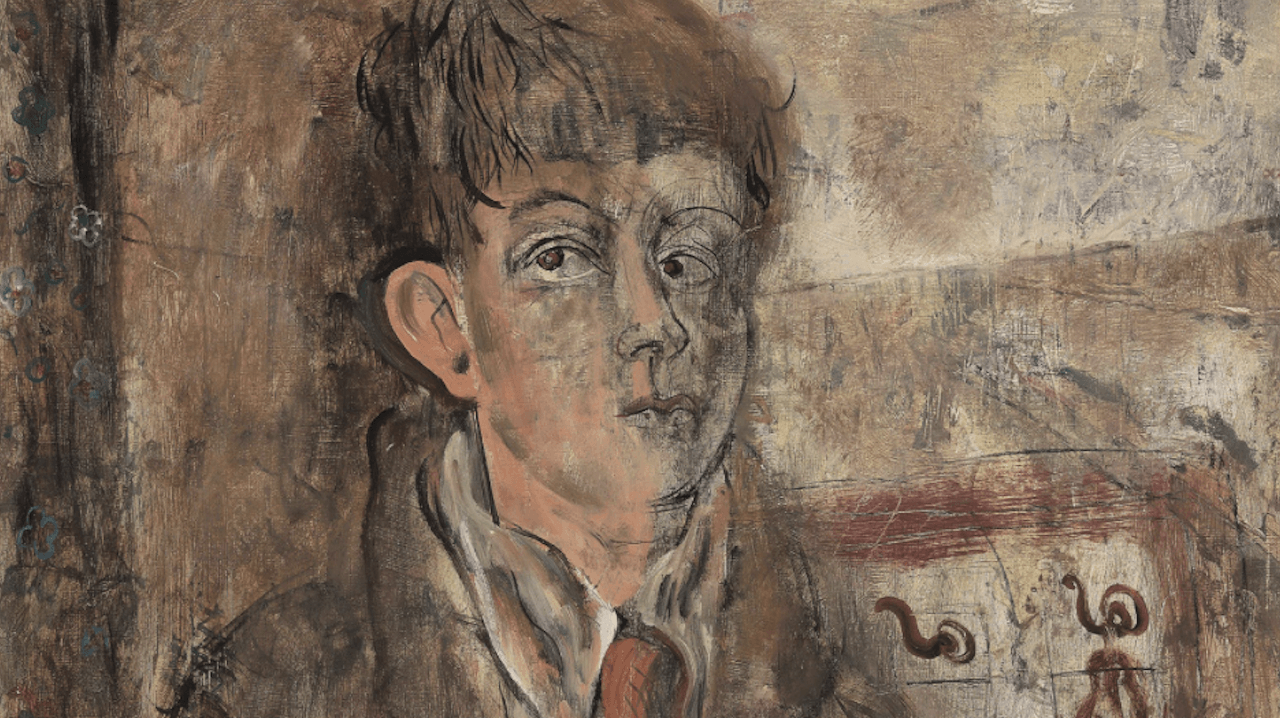Signs, Sacraments, & Anamnesis: Excerpt from 2020 Inklings Lecture
by Fr. Gabriel Rochelle
Feast of St Hilarion the Great
Anno Domini 2020, October 21

Nearing his seventieth birthday, David Jones was interviewed in his one-room flat in London by Saunders Lewis, his old friend and leader of the movement for Welsh nationalism and language. Jones’s painful shyness and difficulty with expressing himself orally is noticeable in this BBC program, but the very end is significant. Lewis says to Jones, “Here in this room you are surrounded by all the reminders of the context of your life…and with these paint pots and brushes and everything you keep your contact with the earlier painter.” Jones replies, “Yes, with the whole world of sacraments and signs” (full interview available online here). Sacraments and signs are his natural homeland as an Anglo-Welsh man and as Catholic Christian.
The epigraph that Jones chose for his book In Parenthesis is a quote from the Catholic writer Maurice de la Taille: “He placed himself in the order of signs” (Epoch and Artist, title page and p. 179). Christ entered the human condition, where sign and sacrament are possible as a surplus of meaning. The flowers given to one’s lover are not merely material flowers; they bear the significance of love. They are a sign. By entering the human condition, Christ placed Himself in the order of signs. Sign is foundation of sacrament: this bread and wine bear a surplus; they are at once the body and blood of Christ. To recall Augustine, the sacrament is a “visible sign of invisible grace.” As Jones writes, “A sign must be significant of something, hence of some ‘reality,’ so of something ‘good,’ so of something that is ‘sacred’” (ibid., p. 157).
Jones connects this sign-making of Christ with the concept of anamnesis that is central to the working agenda of The Anathémata, the whole of which emerged from contemplation on the anaphora of the eucharist. Jones had read Dom Gregory Dix’s Shape of the Liturgy, and he was deeply impressed with the idea that the whole life and ministry, passion and sacrifice of Christ are given to the faithful so that they may be present with these realities of the faith, transcending time and space in Eucharist. Indeed, he quotes Dix as follows: “…in the scriptures of both the Old and New Testament anamnesis and the cognate verb have a sense of ‘recalling’ or ‘re-presenting’ before God an event in the past so that it become here and now operative by its effects” (“Mabinog’s Liturgy,” pp. 182-221 in Anathémata, cited at footnote 1, p. 205; italics in the text; quote from Dix, Shape of the Liturgy, p. 161). Anamnesis is not only the heart of Jones’s theology and his concept of art; it informed the whole of his life.
In his essay “The Arthurian Legend,” Jones makes it clear that his entire approach to art is grounded in anamnesis and sacrament (pp. 210f), which for him means that “this thing may be made other.” In his words, what was then must be made now; history must be relevant to the present, and in such a way it will inform the future. Jones called this view “transubstantiated actual-ness.” Tom Dilworth relates an epithet from Jones’s early childhood apposite this adult stance. David overheard his mother ask their doctor, a Yorkshire Quaker, why Friends had no sacraments. The doctor replied, “But surely Mrs. Jones, the whole of life is a sacrament.” As Dilworth remarks, Jones agreed with these words throughout his life (Thomas Dilworth, David Jones: Engraver, Soldier, Painter, Poet [Counterpoint Press: Berkeley, 2017], p. 10).
The “transubstantiated actual-ness” of history, myth, and legend informs all of Jones’s writings. This is especially true of the major works In Parenthesis, The Anathémata, and the latter’s literary predecessor The Sleeping Lord. It is, furthermore, the engine that drives his essay “The Myth of Arthur.” In practice this means that Jones used and mined and valorized the witness of the past as he understood it to inform his present thought and work. But this usage was not grounded in nostalgia; it was based on something other.
This brings us to the important idea, in Welsh consciousness, of hiraeth and cymreictod. […]
*Excerpt from 2020 Inklings Lecture on Oct 17, 2020. Become an Eighth Day Member and we’ll send you a video of the entire lecture, plus three more Inklings Lectures and a public toast to the Inklings. Plus you'll get access to the full digital library.
Contribute to Cultural Renewal by Sharing on Your Preferred Platform
In an isolating secularized culture where the Church's voice is muffled through her many divisions, Christians need all the help they can get to strengthen their faith in God and love toward their neighbor. Eighth Day Institute offers hope to all Christians through our adherence to the Nicene faith, our ecumenical dialogues of love and truth, and our many events and publications to strengthen faith, grow in wisdom, and foster Christian friendships of love. Will you join us in our efforts to renew soul & city? Donate today and join the community of Eighth Day Members who are working together to renew culture through faith & learning.









